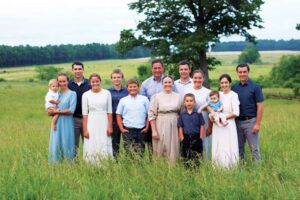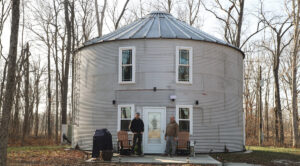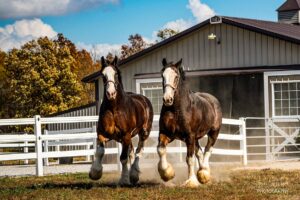In the late 1980s, Amos Brubaker began experimenting with cover crops on the family farm on Tri-County Electric Cooperative lines in Ina. He learned that if he planted cereal rye before soybeans, for example, he could reduce the amount of herbicide needed. That realization became a foundation for the family’s future practices.
His son Nathan took over operations in the mid-2000s, and he continues to work with cover crops to eliminate the need for chemicals. Another crucial change came later.
Eventually, the Brubakers also decided to switch to 100% grass-fed and finished beef. There is a distinction between the two — grass-fed beef can still be grain-finished, while grass-finished graze on grass their entire lives.

“We’re not [using] any grain. We’re doing antibiotic-free, hormone-free, and our goal is to connect people with their food — food that’s quality,” he adds. “You can go to the grocery store and buy a lot of stuff, but there’s no telling how that animal was raised. We felt we had an opportunity to connect people with quality food.”
Today, the farm is nearly 100% no-till, which also reduces erosion. The Brubakers use cover crops as often as possible and have nearly eliminated the use of pesticides. David says these changes have had a profound impact on their land.
“We’re seeing looser soil [and] more wildlife come back,” he says. “[We’re] starting to see a return, a regeneration on the landscape of our soil, our microbiology.”
About 100 head of cattle graze their pastures. The herd consists of Black and Red Angus and Red Devon, a British breed known for being able to finish on grass and for its quality meat.
“We like to select a small animal, because smaller animals require less energy maintenance,” he says. “If you’re going to feed [them] corn, you can easily put weight on a cow. It’s not hard to do that, but we’re only feeding [them] grass, so we try to select for genetics that will finish a lot faster on grass.”
He says the process takes about two years, while grain-fed only takes 14-16 months. There are drawbacks to the speedier timeframe, however. “They’ve got to use antibiotics to keep them alive, where we slow it down [and] make sure we get a good fat finish. We want plenty of marbling in our meat, and it takes 24-26 months to get that done.”
They began selling their meats at farmers markets, and later opened a little store on their farm. Their meat can also be ordered online. The Brubakers also sell pastured pork, chicken and eggs.
“It really started with us trying to heal our land,” explains David. “We start to see more biology. … That was a big driving force. Then there’s just learning from other farmers who have done this before.”
The Log Cabin Ranch
1384 N. Log Cabin Lane, Ina
618-927-7711
thelogcabinranch.com
Farm store hours
Mon-Fri: 7:30 a.m.-5:30 p.m.
Sat: 9 a.m.-4 p.m.









